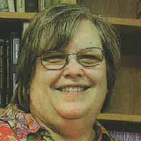Educational Background:
- Bachelor’s Degree in Civil Engineering from the University of Minnesota Twin Cities
- Master’s Degree in Civil Engineering (emphasis on Computer Applications in Water Resources Engineering) from the University of Minnesota Twin Cities
Describe the career path that led you to your current job with the National Weather Service.
- My math and physics teacher submitted my name for a Women in Engineering Workshop. It made me realize that I could do something other than teach; I had planned on pursuing Home Economics Education. In graduate school, I met a NWS employee who had returned to school to complete a PhD. Also, the professor I was teaching assistant for took classes to the North Central River Forecast Center (NCRFC) and it was love at first sight. My first job was in the private sector and I got my dream job with the NWS in September 1982.
What do you do for the NWS?
- I wear a lot of different hats. My primary job is working as a river forecaster. I also work in database management, oversee data quality assurance & control, provide forecast verification, and work in local applications development and support. Additionally, I serve on a variety of office, regional, and national teams. I’m the national subject matter expert on the River Forecast Center (RFC) Archive Database/Flat Files System.
What was the most interesting, exciting, or impactful weather/water event you experienced while working for the NWS and why does it stand out?
- Three years stand out: 1993, 1997, and 2011.
- 1993 stands out because it was the first major event I forecasted for.
- 1997 stands out because of the complexity of the flooding. We experienced record or near record flooding due to spring snowmelt and rains and I forecasted for one of the hardest hit basins.
- 2011 stands out because of the record to near record flooding, the complexity of the forecast, the extended flood period, and the 350 hours of overtime I put in over about six month period.
What made you decide to pursue a career with the NWS?
- I am doing something I love. It is not just a job to me. My NWS career allows me to use my math and science knowledge and fulfills my desire to provide a service that hopefully makes a difference by saving lives and property.
What do you like most about working for the NWS?
- Hard to put into words! I love what I am doing, it pays well, there is always something new to learn, and my job challenges me to try and be the best that I can be.
What advice do you have for someone interested in a career with the NWS?
- Become a student volunteer at a RFC and/or Weather Forecast Office (WFO).
What training or coursework would you recommend to someone interested in following your career path?
- Hydrology, Hydraulics, Water Resources, Meteorology, Communications and Technical Writing.
